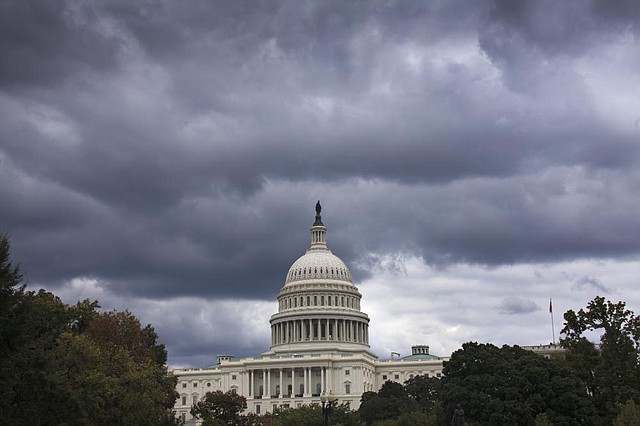House votes to stall health law one year
Federal shutdown looms as Democrats spurn deal
Dark clouds hang over the U.S. Capitol on Saturday where the House of Representatives debated a plan to try to delay President Barack Obama’s health-care law for a year.
Sunday, September 29, 2013
WASHINGTON - Republicans rallied around a budget plan late Saturday to keep the government open but delay the new healthcare law for a year, storming toward a showdown with Democrats that looked increasingly likely to shut down the government when the current fiscal year ends Monday night.
Republicans in the House of Representatives showed unusual unity in endorsing the plan. The House, in a rapid-fire series of votes that stretched past midnight EDT, voted 248 to 174 to permanently repeal a 2.3 percent medical-device tax that helps fund the health-care law, then voted 231 to 192 to delay the law for a year. The House was also expected to approve a measure to assure military personnel will be paid if the government shuts down.
The votes followed a day when Republicans, divided about whether to risk a shutdown or fold and fight another time, came together behind a carefully crafted effort to put pressure on Democrats. The Senate is not scheduled to return to session until Monday afternoon, 10 hours before the fiscal year ends. Democrats who control the Senate said they wouldn’t negotiate or consider the House proposal, leaving no apparent path to compromise on either side in the waning hours before money runs out for many parts of the government not on automatic spending such as Social Security or considered essential such as the military.
The White House threatened a veto of the Republican plan, and press secretary Jay Carney worked to pin the blame for a shutdown on Republicans. “Any member of the Republican Party who votes for this bill is voting for a shutdown,” he said. “It’s time for the House to listen to the American people and act, as the Senate has, in a reasonable way to pass a bill that keeps the government running and move on.”
In the Senate, Majority Leader Harry Reid, D-Nev., said the Senate would not agree to the proposal.
“Today’s vote by House Republicans is pointless,” he said. “As I have said repeatedly, the Senate will reject any Republican attempt to force changes to the Affordable Care Act through a mandatory government funding bill or the debt ceiling. Furthermore, President Barack Obama has stated that he would veto such measures if they ever reached his desk. To be absolutely clear, the Senate will reject both the one-year delay of the Affordable Care Act and the repeal of the medical device tax.”
In debate on the House floor, Republicans rejected charges that they seek a government shutdown, and said their goal is to spare the nation from the effects of a law they said would cost jobs and reduce the quality of care.The law is an “attack and an assault on the free enterprise and the free economy,” said Rep. Pete Sessions, R-Texas.
Democrats disagreed. “House Republicans are shutting down the government. They’re doing it intentionally. They’re doing it on purpose,” said Rep. Donna Edwards of Maryland, as Republican lawmakers booed from their seats on the floor.
Apart from its effect on the health-care law, the legislation that House Republicans decided to back would assure routine funding for government agencies through Dec. 15.
Republicans emerged from a private meeting Saturday afternoon unified and confident that they had the votes to delay the healthcare law and eliminate a tax on manufacturers of medical devices that partly pays for it. But before the House had even voted, Reid said that when the Senate reconvened Monday it would strip out both provisions.
The Senate rejected the most recent House-passed continuing resolution on a party-line vote of 54-44 Friday, insisting on a straightforward bill to continue funding government operations without health-care-related add ons.
The House’s action all but ensured that large parts of the government would be shut down as of 12:01 a.m. EDT on Tuesday. More than 800,000 federal workers deemed nonessential face furloughs; millions more could be working without paychecks.
A separate House Republican bill would ensure that military personnel continued to be paid, an acknowledgement that a shutdown was likely.
“The American people don’t want a government shutdown, and they don’t want Obamacare,” House Republican leaders said in a statement. “We will do our job and send this bill over, and then it’s up to the Senate to pass it and stop a government shutdown.”
GOP aides said that under the legislation, portions of the health-care law that already have gone into effect would remain unchanged. That includes requirements for insurance companies to guarantee coverage for pre-existing conditions and to allow children to be covered on their parents’ plans until age 26. It would not change a part of the law that reduces costs for senior citizens with high prescription-drug expenses.
Instead, the House measure would delay implementation of a requirement for all individuals to purchase coverage or face a penalty and of a separate feature of the law that will create marketplaces where individuals can shop for coverage from private insurers. Consumers can begin signing up for insurance plans under the law beginning Tuesday.
If the government shuts down Tuesday, the roll out of the insurance marketplaces would proceed because most of the money for that program was provided by the Patient Protection and Affordable Care Act and other laws.
Earlier this month, House Speaker John Boehner of Ohio and Republican leaders tried to pass a plan that would have let the Senate strip out health-care language and send the spending bill directly to Obama.
Tea Party-aligned lawmakers rejected that approach, forcing Republican leaders to tie government funding to provisions aimed at stifling the health law.
“It’s exactly what we asked for, and we got it,” said Rep. Michele Bachmann, R-Minn.
Boehner faced a critical decision this weekend: accept a bill passed by the Senate on Friday to keep the government funded and the health-care law intact and risk a conservative revolt that could threaten his speakership, or make one more effort to undermine the president’s signature domestic initiative and hope that a government shutdown would not do serious political harm to his party.
He chose the shutdown option.
“The federal government has shut down 17 times before, sometimes when the Democrats were in control, sometimes with divided government,” said Rep. Virginia Foxx, R-N.C. “What are we doing on our side of the aisle?We’re fighting for the American people.”
Veteran House Republicans said there is still one plausible way to avoid a shutdown. The Senate could take up the House spending bill, strip out the one-year health-care delay and accept the medical-device tax repeal as a face-saving victory for Republicans. The tax, worth $30 billion over 10 years, has ardent opponents among Democrats as well. Its repeal would not prevent the law from going into effect.
Reid has already said he will not accept even that measure as a condition to keep the government operating. Even if he did, a single senator could slow action in the chamber well past the shutdown deadline, and Sen. Ted Cruz, R-Texas, has said he will accept nothing short of a one year delay.
A senior Senate Democratic leadership aide said the Senate will strip both healthcare provisions out of the bill and send it back to the House once again clean of policy prescriptions.
“By pandering to the Tea Party minority and trying to delay the benefits of healthcare reform for millions of seniors and families, House Republicans are now actively pushing for a completely unnecessary government shutdown,” said Sen. Patty Murray of Washington, the Democrat who leads the Senate Budget Committee.
After government shutdowns of 1995 and 1996, Republicans were roundly blamed. Their approval ratings plunged, and President Bill Clinton sailed to re-election. This time they say they have a strategy that will shield them from political fallout, especially with the bill to keep money flowing to members of the military.
But some Republicans acknowledged that Senate colleagues like Cruz hurt their message by turning policy dispute into a personal crusade.
“I think that the rhetoric coming out of the Senate was a bit of sideshow and a circus and distracted people from what the real goal here was,” said Rep. Michael Grimm, R-N.Y. “The goal was to stop a really onerous law from hurting a lot more families.”
As Congress sparred Saturday, federal agencies made contingency plans for a potential shutdown.
Each Cabinet-level department and federal agency was required to identify essential personnel and determine which operations would continue if no deal is reached by Tuesday.
Although huge swaths of the federal bureaucracy could be forced to close down, many government functions would continue.
Senior Pentagon officials said Friday that the more than 1.3 million active military personnel would remain on duty during a shutdown. If a troop-funding bill isn’t passed, personnel probably would not receive their paychecks until a spending agreement is reached.
Documents released Friday by the Pentagon listed essential duties that would be carried out during a government shutdown, including recruitment, intelligence and surveillance, fire protection, counseling and other services for sexual assault victims, operations of mortuary facilities for fallen service members, and a broad range of medical care.
The military is one of several departments whose employees are considered essential for national security purposes. The Department of Homeland Security would have to furlough about 14 percent of its employees, far fewer than many other Cabinet-level agencies.
On Saturday night, Defense Secretary Chuck Hagel criticized Congress as “astoundingly irresponsible” and said that using threats to shut down the government to satisfy a political goal is dangerously shortsighted.
Hagel, who oversees as many as half of the 800,000 government civilians who would be furloughed this week if Congress doesn’t reach a budget agreement, said the impasse threatens to delay paychecks to troops serving in Afghanistan.
“When you look at the greatest democracy in the world, the largest economy in the world, and we’re putting our people through this - that’s not leadership. That’s abdication of responsibilities,” Hagel said on a plane en route to South Korea, where he’ll lead meetings with top defense and diplomatic leaders in South Korea and Japan. “This is an astoundingly irresponsible way to govern.” Information for this article was contributed by Jonathan Weisman, Jeremy W. Peters, Robert Pear, Michael S. Schmidt, Thom Shanker and Andrew Siddons of The New York Times; by David Espo, Alan Fram and Lolita C. Baldor of The Associated Press; by David Lightman and William Douglas of McClatchy Newspapers; and by Roxana Tiron, Richard Rubin, Kathleen Hunter and Derek Wallbank of Bloomberg News.
Front Section, Pages 1 on 09/29/2013


